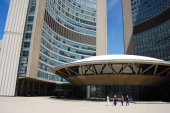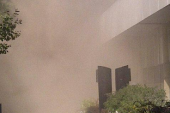
Last month, Toronto City Council appointed George Elliott Clarke the city’s fourth Poet Laureate. Toronto Standard spoke with Mr. Clarke to find out just what the heck a Poet Laureate does and whether poetry could potentially puzzle out some of the city’s pesky persistent problems.
I’ll be honest, I’m fairly ignorant about what a Poet Laureate does. The only Poet Laureate I’ve ever heard of was Rollie Pemberton (aka Cadence Weapon) from Edmonton. Tell me a little about your job. What is your role in the city and what do you hope your role to be?
It’s a great question first of all and I think it’s one that continues to be a work in progress of what the Poet Laureate should do or represent. The idea of this post goes back to Britain which has has a long history of Poets Laureate on a national scale. That idea crossed the Atlantic in the mid-twentieth century and was adopted by the United States. You used to have a position as the Consultant in Poetry to the Library of Congress, that’s what it was called. There were several fine American poets who filled that position that eventually became known as the Poet Laureate. In Canada, the evolution of the position started a bit later. I’ve got to say, I haven’t done enough research yet but I would argue that it was probably the 1990s when you began to see the installation of Poets Laureate in various Canadian cities: Ottawa, Halifax, Toronto of course. (The position of Toronto’s Poet Laureate was initiated in 2001.) But also at the national level, again I should really do more research, I think it was the late 1990s that we started to see the national Poet Laureate who would be appointed by Parliament.
In any event, what does this job mean? I’d have to say that my own job description is fairly loose in that I’m expected simply, in my own opinion, to meditate on what it means to be a citizen of this great city; to, of course, encourage literacy; to encourage and stimulate the development of poetry writing by, particularly, youth, but not only youth, everyone who is connected to the city; and to encourage appreciation of poetry as a living art, and, as we often aspire to create, a timeless art. So it’s a position of outreach I think, in essence, in regards to the notion that poetry is a means of helping us to express ourselves as pithily and powerfully as possible and also as memorably as possible, and a key to the development of our own intellect and as a sense of public expression. I wrote in a poem published recently that writing is public thinking and in a sense, the poet laureate is doing some public thinking about writing.
Say myself or any other Torontonian had a particular poetry problem or maybe something that we needed a poem written about, could we call you or would that be more of a 311 thing?
[Laughs] I have to say that I know it’s my duty to be responsive to any question or all questions related to poetry the citizens of this city may come up with. At the same time I’m only one person I don’t have a staff. So I do anticipate that there will be a website in the near future that folks may want to address questions to me or comments to me through then I will be able to field those questions or comments accordingly, keeping in mind that I still have a day job. I still have a regular job and I need to fulfill that of course, but at the same time I am very interested in the outreach side of this position which does mean being responsive to questions that citizens will have about poets, poetry, Toronto related or otherwise.
I won’t ask you about your political affiliations, but anyone who reads the newspapers can see that there’s a lot of tension at City Hall right now. They city is divided along these political lines. Is it possible, do you think, that a poem could unite the city again?
Well, it’s a tall order to ask a poem to unite a city and I would be really lucky if I were able to compose something that could do that, but to answer your question further and more deeply, I would argue that poetry is about the heart. It’s about the head speaking to the heart and a lot of political and economic and social issues and problems are more related to the heart than they are to the head per se. But that’s the role of the poet, to try and find the intellectual expression that can speak to the emotions. Because I think when you go to the heart, no pun intended, of any political dispute or economic dispute or social dispute, it’s a question of emotion as much as it is a question of intellect and so the poet and the poem ideally fuse both so there may be an opportunity that a poem or a series of poems can speak to public problems but from a personal point of view that may be able to reach both sides, or for that matter, many sides, because sometimes, this is one of the realities that can make political problems intractable, is the fact that there aren’t just two sides, there are many sides, it’s multi-faceted. And so the poem needs to be polyphonous, to have many voices, and many sides as well, to be able to try to unite the polity in understanding what’s at stake, or what are our issues.
And the issues are, again, many sided, multi-faceted. I could think about the budget: I’m a property tax payer, I understand the impacts of the budget on all of us, and the fact that there are many different demands on the budget, all of them being very important, and at the same time that we need to make choices that best reflect the kind of city that we want to inhabit, and, in principle, people from many different sides of the political spectrum have cogent positions on that essential issue of the budget, and should taxes be raised or not, could they be lower, what services are more vital than others… How can a poet intrude on these discussions? I think the way for me or for any other poet can intrude is to remind us all of the fact that it’s not just numbers that are at stake but hearts, feelings, emotions, dreams of the kind of city that we want to have and ideally, poetry at it’s best unites dreams and reality speaks to the fact of reality and the needs of dreams.
What about something like the Gardiner Expressway. A crumbling highway is very poetic imagery. Would you ever write a poem about the Gardiner Expressway?
I haven’t written a poem about the Gardiner Expressway yet, but I share your concerns. As a poet, but also simply as a citizen, I understand that infrastructure is crucial. You’ve got to have well running infrastructure in order to have a better functioning economy and for that matter civic space. It’s hard to have a really attractive and dynamic civic space when your roads and bridges may not be in optimum condition. In fact you may create potential for perils for the public when your infrastructure is not completely up to snuff. And we’ve seen that in terms of the fatality that occurred in Quebec a couple years ago, and the chance of similar misfortune happening here if we are not attentive to infrastructure. At the same time if that’s true it’s also a great opportunity for us to think more fully about the architectural demands of our society, our city and the need to invest in really careful planning and at the same time repair and fix whatever public structures need repair.
To speak simply as a citizen, somebody who also reads newspapers and listens to the news and who drives the Gardiner Expressway and takes the subway, I do understand that these are important elements of our city. But also as a poet. From a poet’s perspective we need to have strong infrastructure to have a strong culture to have a strong arts environment. Artists, like everybody else, need to be able to travel, to get around with a certain amount of ease. This is a large city, so we need to have good public transit, as I think we do, but also good roads and bridges for those who need to drive to get from point A to point B and there ought to be a way for us to come up with a funding structure to accommodate all those needs. And this is pretty earthy stuff we’re talking about: roads and traffic and bridges and transit – civil engineering – it’s all concrete stuff; down to earth stuff. But at the same time, you need to have to foundations, literally, in order to have the superstructure of dream that helps to make life good for everybody beyond the basics.
That almost got poetic there at the end.
Yeah, I was feeling that too, Mike!
Another problem that plagues the city that I think could deal with some poetry is the Toronto Raptors. They’re just a tragic, tragic team. Do you have any poetic words inspire these guys to score a few more points each game, or be a little more clutch in the fourth quarter?
Oh my golly! There’s another terrific question. Gee whiz. Well there’s a tall order for this Poet Laureate. I would say, just speaking off the top of my head, look: The Toronto Raptors are a wonderful team representing this great city, but I also think that they need to take inspiration from their very name. Names are crucial. As a poet I speak to this. When you give something a name you are imbuing it with an essence. So I would encourage the members of the Raptors to really think about the name of the team. What does that mean, to be a Raptor? To be able to swoop down and capture the other team’s control of the basketball for crying out loud! In other words I’m arguing for greater rapturing, grabbing of the opposing teams basketball in order to take control of the game and master the hoops.
More offensive rebounds?
And too that the game is a Canadian invention. A Canadian from Guelph, Ontario invented basketball in the first place. So really we should be remembering that history, remembering the genealogy to a certain extent of the game as well as the name itself to perhaps add extra hope and inspiration to the play of the team. And I realize that these are very superficial things to mention, the name and the history.
No.
But I also think that these are inspirations. When we go to war, unfortunately, we have to remember the tradition of warriors and the tradition of struggle on battlefields, which can also help to imbue soldiers, sailors, pilots, marines and so forth with a battle spirit, and so I would encourage the members of the Raptors to reach back into their own roots – keep in mind the team is still relatively young, but it does have roots – and the name goes back a long way, and the game goes back even further. It’s time for a Canadian team to dominate this game.
This interview has been condensed and edited, but only just a little bit.
____
Michael Kolberg is The Sprawl Editor at Toronto Standard. Follow him on Twitter for jokes @mikeykolberg.
For more, follow us on Twitter at @torontostandard and subscribe to our Newsletter.














